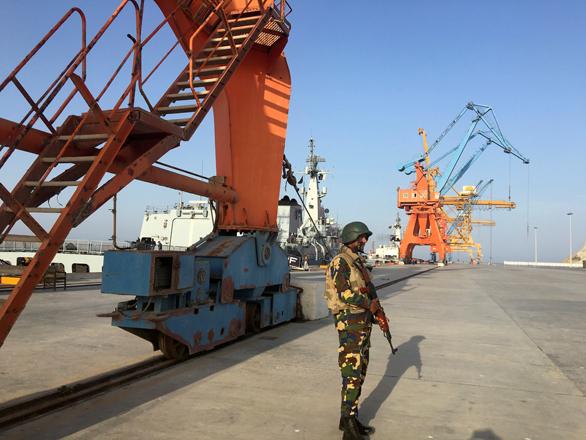You are here
Pakistan shelves privatisation of national airline with new law
By Agencies - Apr 12,2016 - Last updated at Apr 12,2016

A member of Pakistan navy is seen at the Gwadar Port in Pakistan's Balochistan province on Tuesday (Reuters photo)
ISLAMABAD — Pakistan's parliament has adopted a law that will convert the cash-strapped national airline into a limited company but bar the government from giving up its management control, officials said on Tuesday.
The passage of the law, which blocks selling off a majority share in Pakistan International Airlines (PIA), late on Monday, was a major setback for Prime Minister Nawaz Sharif who made the privatisation of the company a top goal when he came to power in 2013.
The privatisation of 68 state-owned companies, which include loss-making enterprises like PIA and Pakistan Steel Mills, is also a major element in a $6.7 billion international Monetary Fund (IMF) package that helped Pakistan stave off a default in 2013.
The government had struggled to meet its deadline to sell PIA, which has accumulated losses of more than $3 billion, after a delay of many months in amending a 1956 law that barred it from being privately owned.
After months of legal wrangling between government and opposition representatives, a joint session of the upper and lower houses of parliament unanimously passed a bill that blocks the privatisation of the airline.
"Management control of the company and any of its subsidiary companies... shall continue to vest in majority shareholders, which shall be the federal government and whose share shall not be less than 51 per cent," the law reads.
The IMF did not respond to e-mails and calls seeking comment.
Privatisation Commission Chairman Mohammad Zubair, who is a member of Sharif's ruling party, said the government would remain the major shareholder.
"We have agreed with the opposition parties that PIA will not be privatised," he told Reuters. "It is only being converted into a private entity to ensure more efficient running."
He said the bill was a compromise because resistance from unions and opposition parties was "too strong".
The government has struggled to restructure loss-making companies, which cost it an estimated $5 billion a year, and which include power distribution companies and steel giant Pakistan Steel Mills.
In February, the government shelved plans to privatise power supply companies. It has, however, made some progress, including raising more than $1 billion by selling its stake in Habib Bank Ltd.
But while the loss-making firms are a drain on resources, about an eighth of the government's fiscal revenue last year, few fear Pakistan will slide into crisis.
The IMF has released instalments of its package despite the missed targets, and the government is exploring other sources of support, like ally China, which plans to invest $46 billion in an economic corridor through Pakistan.
Separately, A multi-million dollar port being developed by China in Pakistan is set to be at "full operation" by the end of the year, a Chinese official said Tuesday, part of Beijing's ambitious economic plans in the region.
Gwadar port, on Pakistan's southwest coast, will see roughly one million tonnes of cargo going through it by 2017, said Zhang Baozhong, chairman of the Chinese public company in charge of the development.
Current trade there is "basically nothing", he told reporters on the sidelines of a seminar about the port's development Tuesday.
"We hope a big jump will take place... Our dream is to make Gwadar a regional trading centre," he added.
Gwadar, in Balochistan province, forms what officials call the "heart" of the China Pakistan Economic Corridor, a grand $46 billion project giving Beijing greater access to the Middle East, Africa and Europe through Pakistan.
The port was built in 2007 with technical help from Beijing as well as Chinese financial assistance of about $248 million.
Zhang said the tonnage will initially comprise "quite a number" of construction materials for the city's development, which Pakistani officials envision turning into another Dubai.
Exports will at first focus on the local fishing industry, he continued, with a modern processing plant planned for the area, though he would not give a timeline for the plant.
"We shall try to process it here... So that the locals can benefit," he told reporters after the seminar.
Desperately poor Balochistan has been roiled since 2004 by a separatist insurgency aimed at seeking greater control over the province's resources.
Some Baloch nationalists have accused the Chinese of conspiring with the Pakistani elite to plunder the province while doing little to share profits and create jobs for local people.
Related Articles
LAHORE — Pakistan's national flag carrier admitted on Friday it was struggling to pay bills and wages after local media reports said the fle
KARACHI — Chinese multinational Shanghai Electric is set to buy the utility serving Pakistan's biggest city of Karachi, in a $1.6 billion de
MILAN — The Italian government on Friday gave the green light to the privatisation of ITA Airways, the successor of Alitalia currently being
Opinion
Nov 03, 2023
Nov 03, 2023
Nov 01, 2023
- Popular
- Rated
- Commented
Nov 03, 2023
Nov 03, 2023
Oct 31, 2023
Nov 03, 2023
Newsletter
Get top stories and blog posts emailed to you each day.














